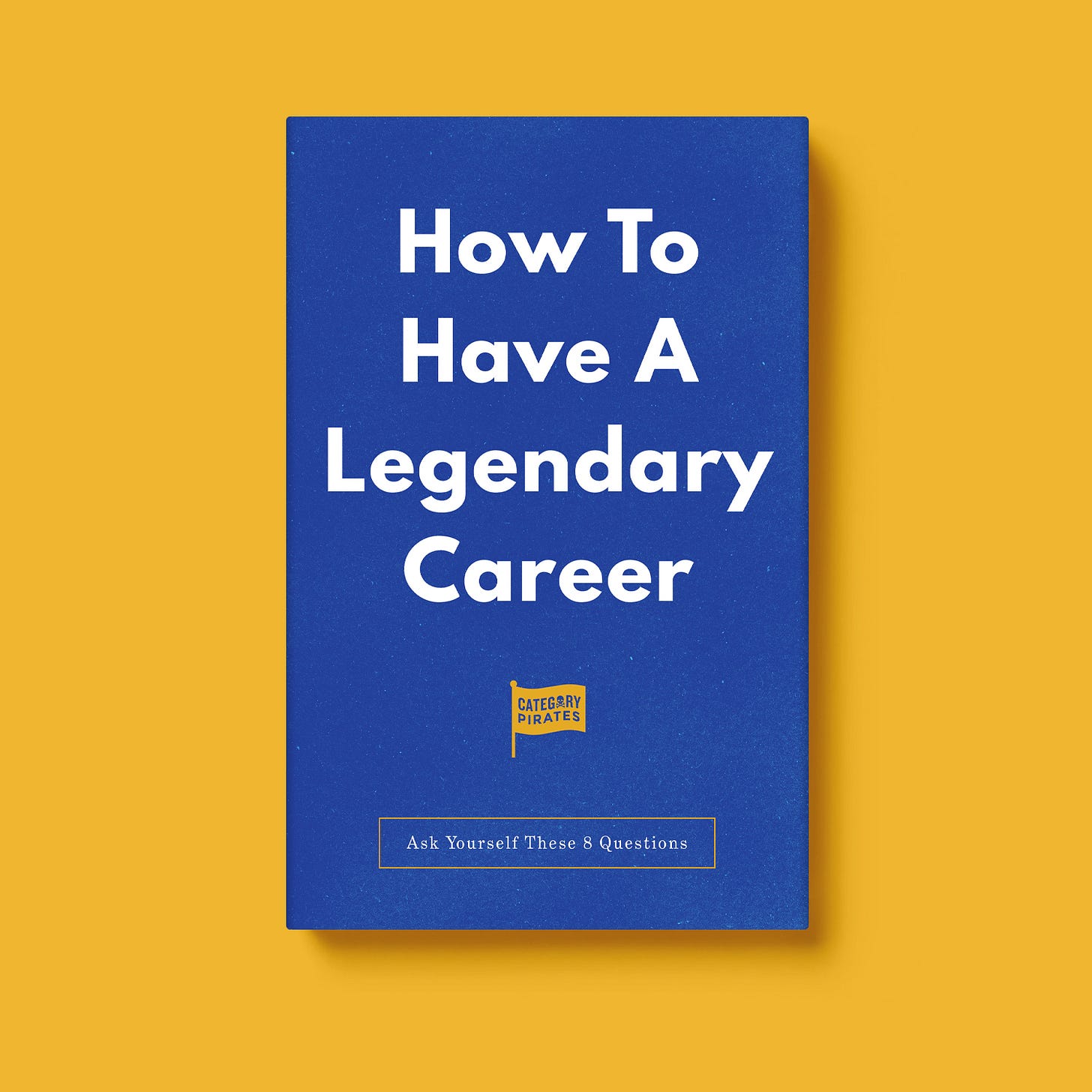How To Have A Legendary Career (Part 1)
You only get ~8 trips to the plate.
Dear Pirates: If our calculations are correct, this means if you read ~50 “mini-books” from us per year, you are getting $5,000,000 worth of business insight. But don’t worry, if you subscribe today for the low-low-low price of $20 per month (or $200 per year), that’s a 99.8247% discount. So, what are you waiting for? Hop aboard The Pirate Ship and let’s get DIFFERENT! ARRRRRRRRR!!!!
Dear Friend, Subscriber, and Category Pirate,
How are you investing your life?
Some of the most-asked questions in business are career-related:
“How do I decide when to leave my current company?”
“How do I pick which company I should join?”
“How do I get a bigger job?”
And so on.
In Silicon Valley (and the broader startup / tech ecosystem), these career questions become even more nuanced:
“How do I know whether a startup is going to become successful?”
“How should I think about taking cash vs equity?”
“When should I sell my stock options?”
Etc.
In order to have a legendary career, period, you need to understand that the broader context goes like this:
1. Category Kings take two-thirds of the economics.
Translation: The only way you make money is by owning equity in a Category King.
Equity in a startup, as a blanket statement or measure for success, is largely worthless. (Most startups go to $0).
Equity in a startup that spends 3-7 years fighting for a slice of an existing category will, at best, only capture 24% of the total addressable market (and that’s if they win the whole thing, which isn’t what happens).
Equity in a startup that fails to become a Category King means the company is now on an “incremental growth path”—meaning your career is also on an incremental growth path.
And equity in a startup that fails to achieve any meaningful leadership position won’t be acquired (for much, if at all), and/or won’t go public, meaning you will probably not have the opportunity to turn your hard-earned equity into a liquidity event.
2. In the venture-backed startup world, less than 1% of startups become a Category King.
According to AngelList data, “a venture-backed seed-stage startup has an estimated 1 in 40 shot—or 2.5% chance—of becoming a unicorn today.” And while the probability of seed-stage startups becoming unicorns has doubled since 2018, that doesn’t necessarily mean your participation is going to be rewarded in the end.
Remember:
enduring success comes from creating a different future. A future that delivers massive value to others. It’s not about achieving a valuation. That is not an outcome. The fact that you convinced a bunch of VCs to value your company at $1 billion is awesome. You should feel happy and proud. But don’t break your arm patting yourself on the back. This game is about enduring value. There is no prize for getting to Mile 5 in the marathon. (As a side note, it’s worth being thoughtful about what you celebrate. Do you celebrate equally when you raise money, make a big sale, AND when a customer has some legendary outcome using your stuff? What you celebrate, and don’t celebrate, says a lot about your aspirations—and the likelihood you will be successful in achieving them.)
On the personal, financial side, it’s critical to understand that the only way employees get cash out of startups is when the company either a) gets acquired or b) goes public (in some cases private companies may give employees an opportunity to sell shares privately, but this is not the norm). And in order for those outcomes to happen, the company needs to be a true category leader. (Yes companies who lose the category battle do get acquired too, but often not for much. Meaning your stock options won’t be worth much. Or worse, be “under water” and thus worthless.)
We have treasure chests full of sunken stock options from startups of yester-year that promised the world and never delivered.
So, remember: you haven’t made any money until you’ve crossed the finish line, exercised the stock option, sold the stock, paid your taxes, and put the cash in the bank (or Bitcoin).
Don’t confuse your net worth “on paper” with your net worth.
3. Over the course of your career, you will only get ~8 trips to the plate.
Let’s keep the math simple.
If your career “starts” at age 25, and the average time spent at a company is 5 years, that means you have 8 swings over the course of your career to produce a legendary outcome for yourself and your family. And if you switch jobs every 3 years, maybe you get an extra 2-3 swings, but that’s about it. (These aren’t Department of Labor statistics here, but it’s close enough for Rock & Roll.)
Which means, in order to have a legendary career, you need to do some serious thinking.
Given the facts (Category Kings take two-thirds of the economics), given the stats (less than 1% of startups become a Category King), and given the math (you only get ~8 trips to the plate), where you choose to work and how you invest your life is what makes the difference between achieving financial freedom, the joy of building something legendary, and having agency over your life—or spending 30 years of your life working for the next Xerox, counting down the days until you retire (and hopefully you have enough money socked away in your 401k).
So, how do you make the most of your 8 trips to the plate? How do you “spot” the Category Leaders, early? How do you know whether you are investing your life in a startup that has a real shot at producing a legendary outcome for the world, you and your family?
You need to ask yourself these 8 questions:






